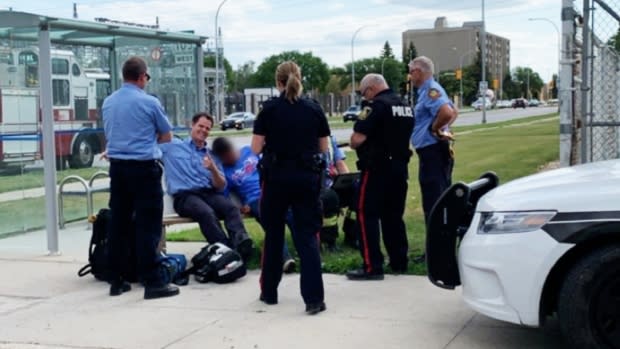Officers involved in photo of intoxicated man should be disciplined, says member of Winnipeg Police Board
A member of the Winnipeg Police Board wants the officers who were caught photographing an unresponsive, intoxicated man to be punished.
"I think these situations warrant discipline," said Damon Johnston, who is also the president of the Aboriginal Council of Winnipeg and voluntary chair of the Addictions Foundation of Manitoba.
"There should be some disciplinary action against [them]."
Winnipeg police apologized Wednesday, after one of their officers took a photo of an intoxicated man while a first responder crew was helping him last Friday.
A photo of the incident, shot from a passing vehicle, garnered widespread backlash on social media. In that photo, the unresponsive man can be seen with his head on the shoulder of a smiling Winnipeg Fire Paramedic Service employee.
"I find it reprehensible, unacceptable, immature, and not in any way within the duties and responsibilities of a police officer, or a paramedic, or anybody else," Johnston said.
"It certainly suggests to me, individuals who are lacking respect for others ... who maybe shouldn't be in the roles that they're in," he said.
"Addictions are not funny.… If these individuals are truly laughing at this person, it's pretty sad.
"You couldn't be more vulnerable," he said. "You're not conscious, you don't have awareness of what's happening around you. Anyone that finds you in that state can take advantage of you."
When asked what disciplinary action the officer involved could face, a spokesperson for the Winnipeg Police Service sent CBC a link to a police officer's code of ethics.

'Incredibly problematic'
This sort of behaviour from police officers is happening throughout the world, according to Christopher Schneider, an associate professor of sociology at Brandon University, and the author of the book, Policing and Social Media: Social Control in an Era of New Media.
"I find it incredibly problematic, however probably not entirely surprising," he said.
Schneider said sometimes people who work as police or emergency medical services become desensitised to what they're seeing, and will take photos of the scenes they encounter as a way to sensationalize what they're doing.
Schneider points to one story from 2017, where police officers in Australia took an intoxicated man home and took a selfie with him in his bedroom.
Another case happened in Ohio, where police there posted a photo they snapped of a couple who had passed out in their car after overdosing on heroin with a child in the backseat.
"People see these different images including police officers — of their colleagues from other countries and other police services — doing similar things," Schneider said. "It wouldn't be too much of a stretch for police in this particular context to think what they're doing is not necessarily problematic."
Schneider said these cases should provide an opportunity for the force and EMS to look at their policies around social media more closely, and look at changing them.
Photo-documenting police power
People increasingly feel like they have a right to photograph others, even when someone can't consent, according to Neil McArthur, director of University of Manitoba's Centre for Professional and Applied Ethics.
"Right now, people really take pictures of everything," McArthur said.
"There is still not enough awareness of the need to be careful in terms of how people are being photographed."
He said this case is particularly troubling since it involves police officers and EMS, who are supposed to be in a position of trust, but are also in a position of authority.
"What is it about people who are in these positions of power, that some feel they have to photo-document their power over people who are in positions of vulnerability?"
What is it about people who are in these positions of power, that some feel they have to photo-document their power over people who are in positions of vulnerability? - Neil McArthur, U of M Centre for Professional and Applied Ethics
McArthur said often the incidents tend to involve white police officers interacting with minorities, something that undermines their trust.
"It plays into a general sense among members of a certain population of vulnerable people in this society, that the police aren't there to help them," he said.
"We want people who are in vulnerable states to look to the police as people who will help them, and not take advantage of them."



